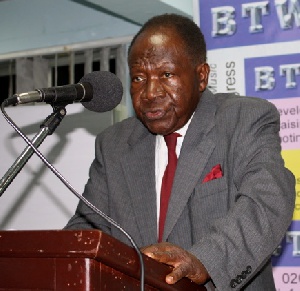 K.B. Asante - Retired Diplomat
K.B. Asante - Retired Diplomat
Mr Kwaku Baprui Asante, a retired diplomat, has asked policymakers to develop educational policies that are driven by national problems and are required for social and economic change.
He noted that many previous policies framed to drive the country’s educational sector and national development were ad hoc in nature, and were fundamentally influenced by international donors.
Mr Asante said this during a presentation on the topic: “The Partition of Africa and the Gold Coast under Colonial rule”, as part of the 10th Kwame Nkrumah Memorial Lecture series, held on the theme: “Whence Ghana? Whither the Nation?”
The lecture is the second of the series.
Mr Asante noted that the country’s education sector would not trigger the change required to drive the national economy if leaders continued to bring about ad hoc polices and overly relied on donor funding.
“Our educational policies should reflect our problems and needs, and not subject to international goals, we easily accept suggestions without considerations, even if they have hidden cost on us,” he said.
He noted that international funding support had some “hidden cost” with the attendant consequences of twisting national goals.
The Kwame Nkrumah Memorial Lecture series was instituted by the University of Cape Coast in 1974 and inaugurated in 1976 in memory of the first President of Ghana.
The lectures raise social, economic and political issues that had largely been of deep concern to Dr Nkrumah and bordered on the rapid development of Africa and the Black World.
Highlighting the background of the lectures, Professor Domwini D. Kuupole, the Vice Chancellor of the University of Cape Coast, said the first in the series was delivered in November, 1976 by Chief Obafemi Awolowo, a veteran Nigerian Statesman, the then Chancellor of Ahmadu Bello University in Zaria, Nigeria.
The first lecture series for 2015 was on the topic: “How Our Fore bearers settled in the land, The Free Trade and its Effect on the People.”
The topic explored the Ghanaian character, which enabled the different groups of people who arrived at the present abode to live together to promote the welfare of communities of kin or tribes in spite of occasional conflicts.
The lecture recalled how gold and other precious goods were sold in exchange for arms and drinks, and the slave trade largely replacing this form of trade, giving rise to the consideration of the human being as a commodity.
The third lecture would be held at the University of Cape Coast, on Thursday, October 15, on the topic: “Independence and its Great Expectations. Loss of self-esteem and self-reliance. The future depends on Ghanaians.”
It would focus on mental emancipation and suggest the way forward.
The lecture would seek to establish that self-confidence is imperative if Africa and Ghanaians, in particular, are to manage their own affairs in the interest of their people as no development partners can develop Ghana or other African countries among other topics.